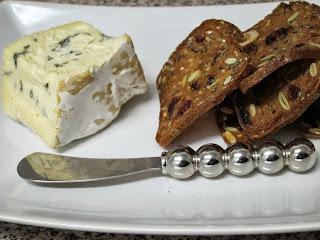CHEESE PLEASE! There is a new Trade Deal being worked out by the Canadian Government and the European Union. So what's all the fuss about? More products will be able to be imported into Canada without Tariffs. YEAH you say... we get more stinky cheese... but there are a lot of people that aren't happy about this deal. Mainly some of the great Canadian Cheese Producers in this Country. A lot of great cheese is produced in Ontario and Quebec. Monteforte Dairy is one of them, they produce cheese in the Stratford area and sell their cheeses at many local farmer's markets. But they aren't the only ones. There are a lot of great goat cheeses and even Agropur cheese company that produce OCA cheese in Quebec. They feel that the opening up of imported cheese to the Canadian Market will take away sales from the Canadian producers. The government says this deal will create many jobs, but I suppose the Canadian cheese producers feel that it will also take away some of their jobs.
I am conflicted on this deal because I have been to Paris and one of my favourite cheese's that I ate there was Caprice de Deux and it has been sold at some places in Ontario but with Canadian standards it didn't quite taste the same. I would love to see more new cheese selections in Ontario but I understand how hard it already is for Canadian producers to make a living in Canada.
 There are always winners and losers in any trade deal but I suppose you have to weigh what's best for the majority of people when making decisions. Here are some of the numbers according to the CBC.
There are always winners and losers in any trade deal but I suppose you have to weigh what's best for the majority of people when making decisions. Here are some of the numbers according to the CBC.WHAT DO YOU THINK? Is it just a lot more stinky cheese?
Imports from Europe that would see tariffs eliminated include: automobiles, industrial machinery, wine and spirits, some cheeses, fish and seafood products and many others.
Here's a look at more numbers, from Canadian and EU documents and briefings, related to what both sides have called a "historic" deal:
35 million: Population of Canada.
500 million: Population of European Union.
28: Number of countries in the European Union.
$17 trillion: EU's current annual GDP, the measure of its economic activity.
$1.8 trillion: Canada's current annual GDP.
$12 billion: What the Harper government expects in added GDP for Canada annually.
$16.3 billion: What the EU expects in annual GDP gains for Europe.
$1.5 billion: Annual value of increased agricultural exports expected by Canadian producers.
$700 million: What the EU expects in annual tariff savings (and what Canada would lose in duties).
20 per cent: The government's estimated increase in bilateral trade as a result of the deal.
29,000 tonnes: EU cheese allowed into Canada tariff-free annually, up from 13,000, once fully implemented.
65,000 tonnes: Annual quota for Canadian beef in Europe, up from 15,000, once fully implemented.
75,000 tonnes: Annual quota for Canadian pork, up from 6,000, once fully implemented.
100,000: Number of cars Canadian automakers will be able to export a year, 12 times the current limit.
2 years: Extension of drug patents for brand-name pharmaceuticals.
24: Number of languages into which the agreement must be translated.
5 years: Time elapsed since initial study of a trade deal began.
2 years: Expected length of time before deal is ratified.


No comments:
Post a Comment
If you post Spam links in this comments section they will be deleted.